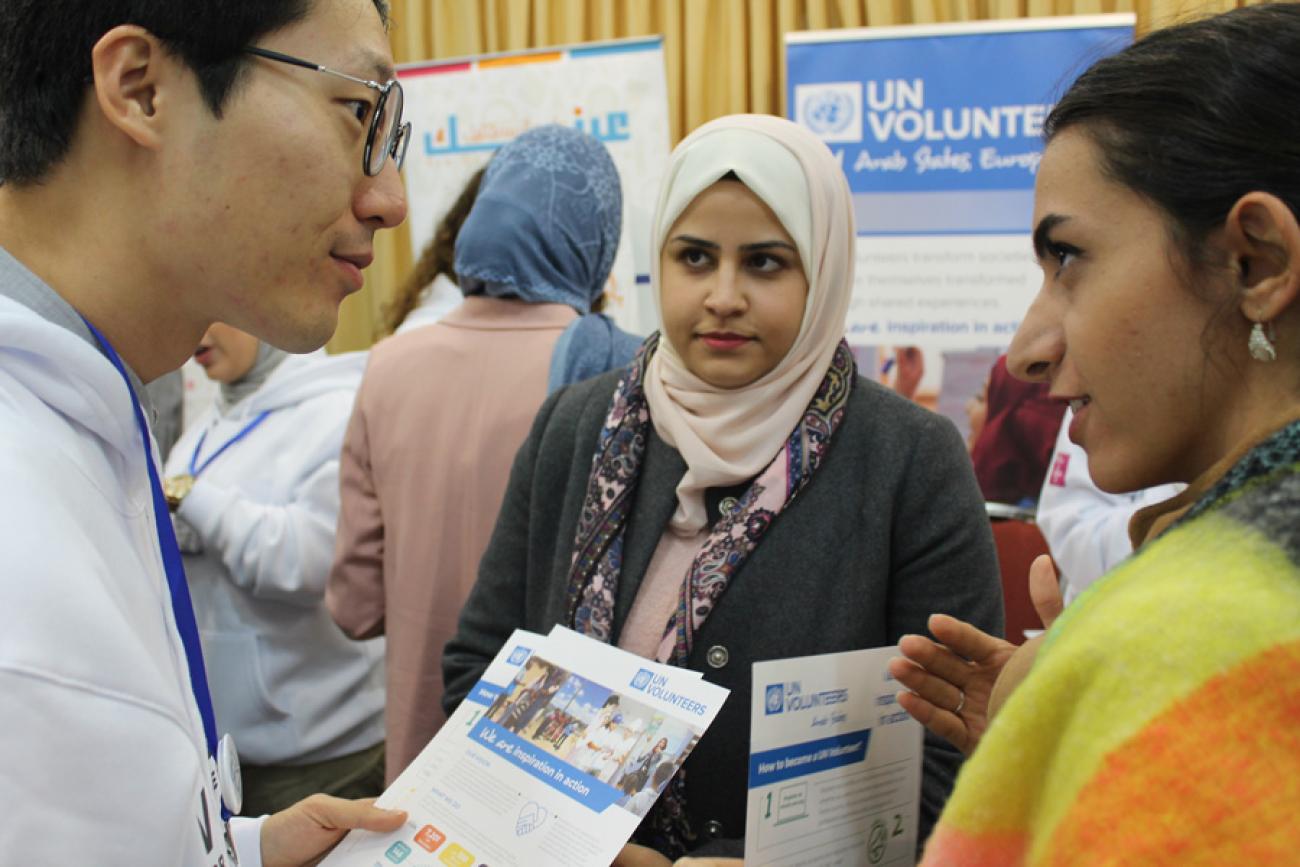Together we learn: Supporting inclusive education for refugees in Jordan

UN Volunteers are serving with UNICEF and UNRWA in Jordan, performing activities which enable a quality education for refugee children.
Jordan is host to around 3 million refugees. The majority (2.3 million) are Palestine refugees registered with UNRWA - alongside some 156,107 other registered persons. This includes 634,922 refugee youth.
In addition, there are over 775,000 persons of concern registered with the UN Refugee Agency (UNHCR) as refugees and asylum seekers in the country, including 667,000 Syrian refugees - nearly half of whom are children under 18 years old.
Dong Yeon Park (Korea) is a UN Volunteer serving with the Education Section at UNICEF Jordan. Dong Yeon provides report writing and publication assistance for monthly donor reports and flagship documents, such as the Jordan Country Report on Out-of-School Children. Such publications map specific communities, illustrate vulnerabilities and underscore the status of children and youth separated from school.
Indeed, 1.6 billion children and youth were out of school worldwide in 2020 and although many nations moved schooling online, remote learning was inaccessible for at least 500 million students. In Jordan, refugees were disproportionately represented among students separated from school and more likely to drop out of school than their Jordanian counterparts. These reports are therefore establishing a knowledge baseline, from which partners identify the most vulnerable, develop retention strategies and implement targeted interventions.
Further, Dong Yeon recently participated in focus group interviews with teachers and principals, as part of a broader feedback and inclusion exercise.
From what we heard from teachers, what matters most are the relationships, parent support, help with homework, proper nutrition and rest. These are the factors teachers looked at to foster student engagement and recovery. --Dong Yeon Park, UN Volunteer Education Assistant with UNICEF, Jordan
Jongmin Weon (Korea) also serves with the Education section at UNICEF Jordan, as a UN Volunteer Data and Knowledge Management Officer. Jongmin performs analysis from the data disseminated by the Ministry of Education, from kindergarten to grade 12. The data is utilized in part, to identify the needs of particular schools and further support a shared vision of and approach to education.
Data analysis and reporting has been particularly significant because of unprecedented challenges posed by COVID-19. We have been steadfast in hard times, delivering information to support students’ needs and the transition from schools to digital learning platforms. When students return to school this fall, we will be there every step of the way.” – Jongmin Weon, UN Volunteer Data and Knowledge Management Officer with UNICEF Jordan
In addition, Jongmin analyzes data from Azraq and Zataari refugee camps, non-formal and second-chance education programmes for youth separated from school, with an eye toward re-enrollment. Later this year, he will begin supporting the Learning Bridges programme, which aims to reach one million students in grades 4-9 through a blended learning platform.
Saki Komahashi (Japan) is another UN Volunteer supporting refugees in Jordan. Saki serves with UNRWA as Youth Outreach and Development Officer and is spearheading the development of an Agency youth strategy. Saki performs both desk research and field interviews, learning how UNRWA and its partners provide youth with basic services including education, health and social services and adapted learning programmes to the COVID-19 context. In interviews with refugees, she also became concerned about high unemployment and the exclusion of youth in the workforce.
"Youth often work informally and are among the first lay-offs in a crisis. Completing formal education and vocational training are therefore needed to help them participate in the formal labor market." says Saki Komahashi, UN Volunteer Youth Outreach and Development Officer with UNRWA, Jordan.
"However, many refugee students have struggled to continue their studies online during school closures. The costs associated with mobile phones, computers and internet access have impacted their ability to gain digital skills. In some cases, a single mobile phone is shared by an entire household.” – Komahashi adds.
While the pandemic poses formidable challenges, Saki is undeterred. She is determined to develop strategies that increase access to education and training, elevate youth refugees’ voices and support youth participation in various UNRWA programmes as well as those offered by other organizations.
Alongside UN partners, UN Volunteers stand with refugees and host communities in building a more inclusive future, where we can together heal, learn, and shine.




